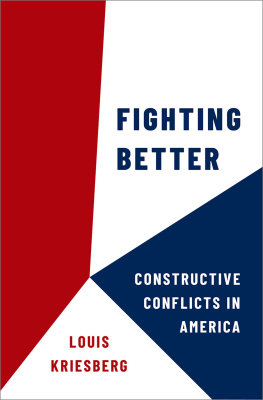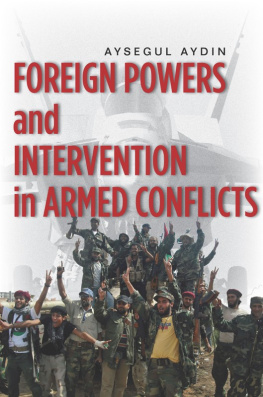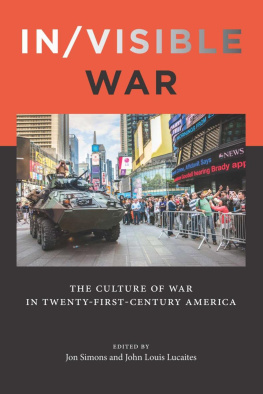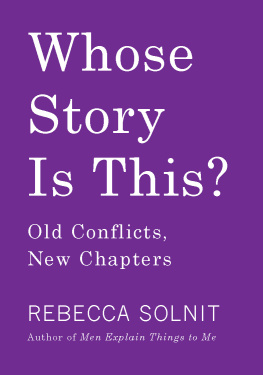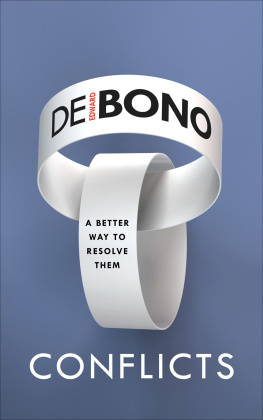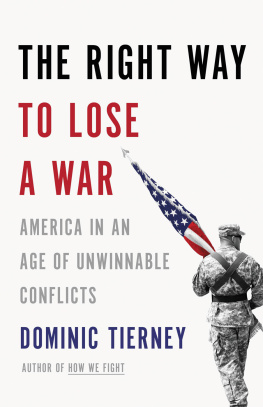Fighting Better

Oxford University Press is a department of the University of Oxford. It furthers the Universitys objective of excellence in research, scholarship, and education by publishing worldwide. Oxford is a registered trade mark of Oxford University Press in the UK and certain other countries.
Published in the United States of America by Oxford University Press
198 Madison Avenue, New York, NY 10016, United States of America.
Oxford University Press 2023
All rights reserved. No part of this publication may be reproduced, stored in a retrieval system, or transmitted, in any form or by any means, without the prior permission in writing of Oxford University Press, or as expressly permitted by law, by license, or under terms agreed with the appropriate reproduction rights organization. Inquiries concerning reproduction outside the scope of the above should be sent to the Rights Department, Oxford University Press, at the address above.
You must not circulate this work in any other form and you must impose this same condition on any acquirer.
Library of Congress Cataloging-in-Publication Data
Names: Kriesberg, Louis, author.
Title: Fighting better : constructive conflicts in America / Louis Kriesberg.
Description: First Edition. | New York : Oxford University Press, [2023] |
Includes bibliographical references and index.
Identifiers: LCCN 2022030861 (print) | LCCN 2022030862 (ebook) |
ISBN 9780197674802 (Paperback) | ISBN 9780197674796 (Hardback) | ISBN 9780197674826 (epub)
Subjects: LCSH: Social conflictUnited StatesHistory. |
Social classesUnited StatesHistory. |
Income distributionUnited StatesHistory. |
DemocracyUnited StatesHistory.
Classification: LCC HN90 .S6 K66 2022 (print) | LCC HN90 .S6 (ebook) |
DDC 303.60973dc23/eng/20220808
LC record available at https://lccn.loc.gov/2022030861
LC ebook record available at https://lccn.loc.gov/2022030862
DOI: 10.1093/oso/9780197674796.001.0001
Contents
Writing this book was prompted by the recent distressing developments in the United States. The country is fiercely divided. Many people are fearful of further deterioration of the democratic system and are distraught and even in despair. For three primary reasons, I believed I could write a book that would help explain how such unhappy developments happened, and also, importantly, how they might be overcome.
First, I have enjoyed the good fortune of a long life. As a teenager, I was horrified by what I learned of the terrible wars in China and Spain, and then throughout Europe and Asia, soon engaging the United States. I became and remained determined to strive to help avoid such tragedies in the future. I witnessed and to some degree experienced the recovery from the Great Depression and, in later years, the effective struggles for more equality and justice in America. So I came to know that terrible things happened in America, but that triumphs were also accomplished.
Second, I studied and researched international conflicts engaging the United States, finding patterns of conduct that sometimes had terrible consequences but sometimes good consequences. I did this work utilizing the perspectives of the social sciences, and particularly of sociology. I discovered grand theoretic explanations and many smaller generalizations. I learned the value of gathering and examining all kinds of data. I believed that by comparing variations in consequences, I could discern better policies.
Third, I participated in the creation of the broad field of peace research and conflict resolution. It occurred to me that I could apply these findings to a variety of conflicts within the United States during the last seventy-five years.
With this background, I had the audacity to start working on this book, and I have devoted a few years to it. Concerned about the recent troubles in the country, I had decided that a book that examined many conflicts in America since 1945 could help explain how Americans sometimes suffered destructive conflicts, but also had fought constructively to overcome troubles and advance equality, justice, and freedom. I trust that the readers of this book find it interesting and useful in understanding how conflicts can be done better. Perhaps some readers will even apply the findings in practice.
I did not write this book alone, but I do take responsibility for it. Although I officially retired many years ago, I continue to have access to the resources of the Program for the Advancement of Research on Conflict and Collaboration, in the Maxwell School of Citizenship and Public Affairs, Syracuse University. I want to acknowledge particularly the following people who read portions or all of the book drafts, or in other ways helped me in completing it: Michael Barkun, Hans Guenter Brauch, Frederick F. Carriere, Bruce W. Dayton, Todd Dickey, Catherine Gerard, Susan T. Gooden, Joseph Kriesberg, Daniel Kriesberg, Jerry Miner, Tina Nabatchi, Robert A. Rubinstein, Tara D. Slater, and two anonymous readers chosen by Oxford University Press. I thank Angela Chnapko, Senior Editor, Oxford University Press, for her responsive oversight of the complex publishing process. Finally, I want to thank Paula Freedman, my partner, who wonderfully supported the project through all its stages, with fine editing and enlightening conversations.
Americans have often been divided and antagonistic in profound ways throughout their history. Destructive conflicts have been waged many times throughout US history. However, many conflicts were also constructively conducted so that they yielded progress toward greater liberty and justice for all Americans. In this book, I compare conflicts, examining how some conflicts, since 1945, were waged more or less well and other more or less badly.
In the years of Donald J. Trumps presidency, prior increasing political polarization and antagonism further intensified. They were deepened by a violent insurrection in Washington, DC, on January 6, 2021. The political system, at the national level, had become highly partisan and was seriously deadlocked. Profound differences even exist about what is true and what is false, about who is to be believed and who is not. Intense fights occur at the state and community levels. These developments have raised widespread fears about the survival of American democracy. I examine how badly waged conflicts have contributed to getting the United States into this morass and previous troubles, and how constructively waged conflicts in the past have helped overcome troubles and advance democracy. Such an examination can help answer questions about how the United States got into such troubles and how it can get over and past them in the future.
Analyzing Domestic American Conflicts
The turmoil leading to the January 6, 2021insurrectionwas the result of many prior developments in the United States and the surrounding world. These developments include many technological changes in the production of rapidly increasing innovative products and services. They are also related to other trends and forces, such as changes in demography, trade, and communications, and to enduring cultural ways of thinking and believing. The implications of these developments, however, were not inevitable. They were channeled in major ways by broad conflicts or discrete fights about how to deal with them.
This book examines many of those conflicts, focusing on those related to three primary dimensions of all human societies: class, status, and power. These are fundamental analytic dimensions of relations among socially defined groups of people who are differently ranked. They are the arenas in which many conflicts arise and are waged. The conflicts are often about changing the degree of inequality in each dimension. Of course, peoples relations incorporate all three dimensions, and peoples placement in each dimension affects their ranking in the other dimensions. There are many sociological, social-psychological, and economic processes that drive the course of conflicts, and they will be noted in my analyses of conflicts in this work. The focus of the analyses is to assess how the conflicts did or did not advance equity between contenders in different rankings in class, status, and power. Advancing equity is consistent with realizing basic rights for all Americans, as discussed later in this introduction.

